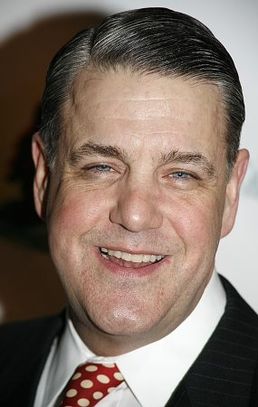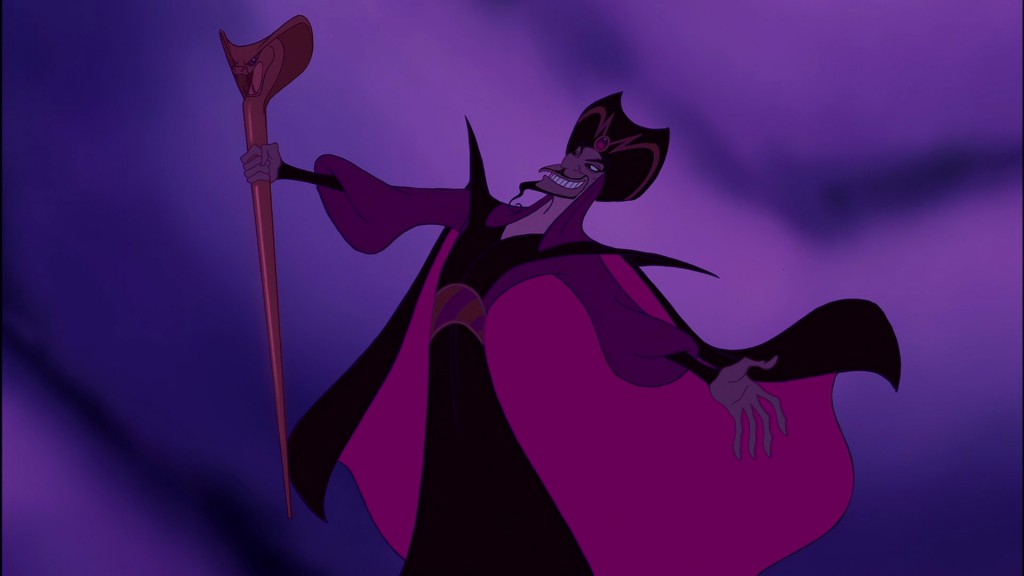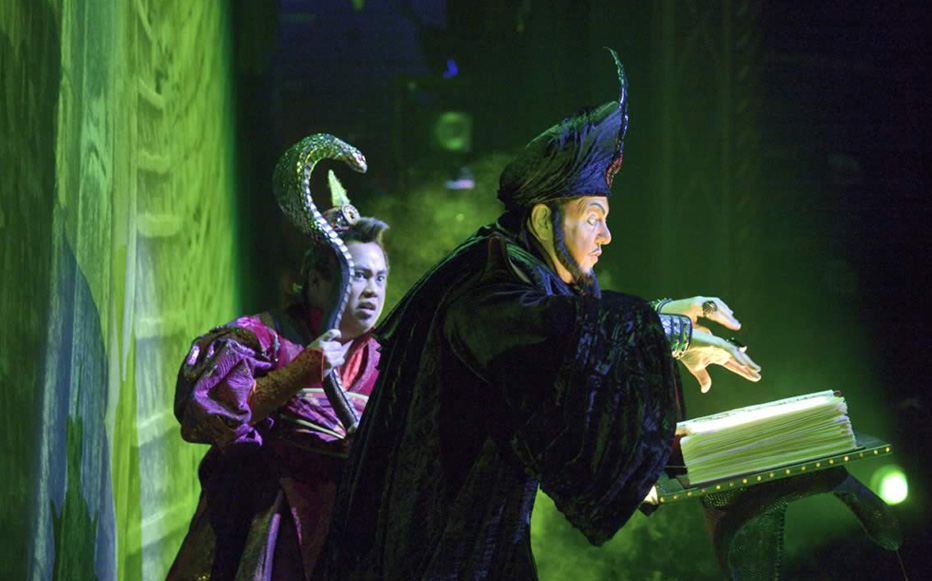To celebrate the release of Aladdin on Blu-Ray and Digital, we had the chance to take to Jonathan Freeman who voiced Jafar in the film and is currently performing the role on Broadway.
FanBoy: Thank you very much for taking the time out to talk to me.
Jonathan Freeman: Pleasure.
F: Congratulations on the upcoming home video release of Aladdin. You’re Disney famous, if not world famous, for your role as Jafar. Can you tell us a little bit how you got the role?
J: Sure. I auditioned, basically, like every other regular actor auditioned for the part. I think that the history to my audition, though, goes back a few years before, which is that I had done an off-Broadway musical that was called In A Pig’s Valise, that was being cast by a man named Albert Tavares. At the time, Albert Tavares was the casting director for the Disney films. I can’t remember the exact timeline, but a certain amount of time after I had done In A Pig’s Valise, I got this audition for Aladdin. When I went into the room to audition, the casting director was in fact Albert Tavares. I have to say that part of my getting the role, in fact, was due to Albert, and the diligence of my representative getting me the appointment, because I wanted to do a Disney animated feature since I was a kid. Specifically, I always wanted to play a villain.
That was really it. It was 1990, I had an audition, and then three months went by. Then I had a callback, and just before Christmas of 1990, I booked the job, and I went to work in January of 1991.
F: While you were recording the role for Jafar, did you realize how special the project would end up being?
J: Well, yes and no. To me, Disney animated features were always special, because I grew up with them. Of course, when I was growing up they weren’t as accessible on television or VCR or tape, or… sorry, DVD’s. They hadn’t been invented yet, we actually had to go to a movie theater to see them, so they were very special. Then it was a big event to go see a new Disney animated movie. That’s one thing.
I was always attracted to the characters of the villains and some of the sidekicks. I always thought that they were fantastic and I always liked not just the way that they were drawn, but the way that they were acted and the way they were depicted in Disney features. It was very black and white, you were good or you were bad. No two ways about it. The villains and villainesses always were attractive to me because of their scale. I liked their operatic scale, I liked their powerful natures and their sort of cruel beauty. They all have their own sort of cruel beauty, the villains, no matter who they are, which has to do largely with the drawing and the animation. I suppose with that comes along a voice, a cruel, beautiful voice, and that was always appealing to me. I always liked the idea.
It’s always been important to me and specifically villains. I always was hoping that one day I’d get to do that. I started acting when I was a kid, and all of a sudden it was happening. It was a big surprise, and I did think that it was a special project. I knew that it was special for several reasons. I knew that, for one thing, they had snagged Robin Williams to play the Genie. I thought, “Well, that can’t be bad.” That’s a great coup for a Disney animated movie.
I don’t know, I just guess I felt the nature of the movie. There were some ups and downs, as I suppose there are with most new projects, artistic endeavors, no matter what they are; but it always seemed to me that it would have staying power, that it would surface. It’s a great story, it’s a story that’s been around for a very long time, and it’s been done many times before. We’ve seen many different Aladdins and so we know that it’s a powerful story. The idea of having wishes, and wishing for the right things, I think it’s very appealing. I think it’s a story that everybody likes, everybody gets.
Yeah, I guess in that respect I thought that it would be special. Did I know that it would have such staying power, and that 23 years later there would have been a Return of Jafar, and there would have been all these other ancillary things that go along with it, in addition to doing the Broadway musical onstage now in New York City; I would have not one clue about any of that. There was no Disney Theatrical at the time. Like I said, there was no way for me to work on it except to get on a plane and go out there. There was no phone patching like we’re doing right now. There was none of this. It was just a project. It was a very good project, and recently I was on a train with Gilbert Gottfried and we both agreed that we had no idea when we went to work on it that it would be such a spectacular success. It was just a job. It was a good job that we knew a lot of people wanted, but it was just a job.
F: You mentioned Disney Theatrical. I’m pretty sure a lot of people, when they go see a Disney Theatrical presentation, have been happily surprised when they go through their Playbill and discover the voice of Jafar is in Mary Poppins or Little Mermaid and now your return to the role of Jafar onstage. Can you talk a little bit about your long association with Disney Theatrical?
J: I started with Disney Theatrical by replacing somebody in Beauty and the Beast and then from Beauty and the Beast I worked on The Little Mermaid and then I did The Little Mermaid for a couple of seasons. Then there was an opening in Mary Poppins and they asked me and invited me to go into that, which I was happy to do because I like to work. I’ve always liked to work.
Then, while we were working on that, we started doing readings and workshops of Aladdin and eventually that came to fruition too. It has been a fairly long association and it’s been very… there’s been a lot packed into not that many years, really. I guess it’s about ten years now or something, I don’t even know, but something like that. They’ve been wonderful employers, and it’s quite extraordinary to be doing the role of Jafar now in another medium. I don’t think that there’s any actor who’s ever voiced a character for a Disney animated feature that’s ever taken it to any other medium, as far as I know, so there are a lot of firsts for me with Aladdin. We’ve been together, as you pointed out earlier, together a long time, Jafar and I. It’s turned into many things.
F: It is impressive to me that when you go see Aladdin on Broadway, you kind of get a twofer. You get this new, amazing experience plus you also get to see the voice of Jafar be Jafar. In many ways, it’s like a concert.
J: Well, I hope that that’s what people… I guess that’s what we’re all counting on, that it makes some kind of an impact. To be honest, I don’t know how many people read their programs before the show, and I don’t know how many people know that I’m doing this on Broadway. I mean, it’s not a secret, but it’s also not very well publicized, so I don’t know that it really matters. It matters to me and it matters to people who like the character and come to see the show, I guess. I guess it seems like there’s maybe something authentic about the project by having somebody who was connected to the original project.
It becomes so much more than just what it is. While I was doing Mary Poppins, there was somebody in the audience who read my name in the program, and he happens to be on the Autistic spectrum. His name is Owen Suskind, and his father is a Pulitzer Prize-winning writer and wrote a book about him and his association with Disney. He taught himself how to speak and how to learn to relate to the world by watching Disney animated features. It helped him immeasurably in his life. He’s now a lovely, high-functioning adult and he’s a great person. He’s a lovely guy and I can’t help but think that some of the Disney mythology rubbed off on him and made him that way.
It is much more than just a job, in a way, or has been more than a job. It is a job, make no mistake about that, doing it eight times a week and it was a job working on the filming initially; but it’s an interesting job and it’s given me a lot more than just that — than just being a job and just having a way to continue making my living as an actor. I guess there are legions of Jafar fans; I don’t know that there’s as many fans of Jafar as they are of the princes and princesses in the Disney animated movies. I think it may be a specialized boutique group, although I’m told that that may not be true. Jafar’s always in the top five villains of all time for Disney animated features, and that’s wonderful.
It’s great, it’s very flattering. It makes me feel good. It makes me want to continue to work on it, and I hope it continues.
F: You definitely made an impact. Did you get to meet and work with the animators while they were working on Jafar, while you were working on the project?
J: Yes, I did a little bit. Because I happen to be a big fan, as I mentioned before, of Disney animated features, I asked if it would be possible for me to meet the production team. If nothing else, the principal animator for Jafar, who I already knew something about from having seen his work and I knew that Andreas was very highly regarded there. I wondered if it would be possible to meet him and I did, in fact, meet him and we did start a friendship that’s been really nice over the years. I was very anxious whenever I was in California, because mostly I was in Studio B at the corner of Dopey Drive and Goofy Lane, so I didn’t… you had to go to another whole place to go to the animation bunker, whatever they call it.
It was interesting for me, because it was the first time I’d worked on an animated feature. I’ve done some cartoony voices for commercials and whatnot, but this was really like doing a new musical, except this was this other added element, which was all these fantastic animators. It was quite an education. In retrospect, I wish that I had spent more time. I wish that I made a little bit more of a nuisance of myself and gone over more and met more of the people. I mean, I remember a lot of them, but I certainly don’t remember all of them. There’s so many animators, and they were all wonderful. It was right at the beginning of CGI, they were just starting to use some of it in the movie, and a lot of those people are no longer over there. In retrospect, hindsight is a wonderful thing, “If only…”
Yeah. I did get to meet Andreas and I did get to meet a lot of the team and Ron Clements and John Musker were wonderful people. Wonderful to me, great directors, great storytellers. Alan Menken and Howard Ashman, I mean, they were my champions, I think, for a good deal of the project, so it was wonderful. You know, I’m still working with Alan Menken, because of Aladdin and before that, Little Mermaid. He’s been in my life for quite a long time now, too. Unfortunately, Howard departed way too soon. Then Tim Rice, I got to meet and work with Tim Rice, too. It’s all been pretty exciting and interesting, and it’s hard to believe how this one thing that you do causes so many connections, so many ripples in the water.
When you look back on it, you think, “Wow, this has been a great opportunity. It’s been a great part of my life,” and it’s amazing, really.
F: Now that it’s coming to home video, and through digital and DVD, BluRay, Disney Movies Anywhere and all that sort, what do you hope the new audience, the kids that are growing up, coming up now, who didn’t necessarily grow up with the film, take away from Aladdin?
J: I guess I hope they take away the same thing that the original audiences did. The original audiences are still around, a lot of them, the parents and grandparents of kids who are seeing it now for the first time. I hope it generates the same amount of excitement as it did the first time around. Every few years there’s a whole new batch of young people that like these things, and Aladdin is certainly one of the Disney animated features that I think appeals to adults, too. I think it was a little edgy and advanced for its time at the time, and so it had great wide appeal and still does as we’re doing it now on Broadway.
I hope the same thing happens, I hope it generates a lot of excitement and people wanting to continue to watch it because it’s such a great story.



